
Poker is a game of skill, and while luck plays a large part, players can control their chances of winning through strategy. It also teaches players how to manage risk, which can be important in life.
Discipline and Self-Control
A good poker player is disciplined and can make decisions based on logic, rather than emotion. This is a skill that can be applied to other areas of life, such as finance or business negotiations.
Failure in Poker
A great poker player isn’t afraid of failure, and will learn from it. They’ll learn what went wrong and work on improving their strategies for the future. They’ll also know how to cope with loss and be able to take the lessons they’ve learned and move on quickly.
Developing Instincts
The ability to quickly identify tells and changes in attitude is an essential skill for success in poker. Paying attention to these tiny differences can help you get an edge in the game.
Observing others and paying attention to their body language is another important aspect of poker. Understanding how their body language is changing can reveal information about their hands that you might otherwise miss.
Understanding how they react to different situations can also be helpful in making more informed decisions at the table. This can include their sizing, timing, and position.
Raising and Folding
One of the most effective ways to increase the pot value is to raise the amount of money you’re betting at any given time. This will force weaker hands to fold, narrow the field, and boost the pot. It’s also a bluffing tactic that can be used to draw in opponents with a mediocre hand.
Bluffing
The best bluffs in poker are made with a good combination of cards. These can include a full house, flush, straight, 3 of a kind, 2 pair, or a set.
Raise When You Have a Good Hand
A good poker player knows when to raise or fold, and will use the appropriate action to gain information about their opponents’ hands. A raise is the most common way to do this, but you can also use it to bluff or semi-bluff your opponent into thinking you have a good hand.
This strategy can be used to bluff weaker opponents into folding by scaring them into thinking you have the best hand. It’s a risky move, but it can be profitable in the long run.
Choosing the Right Strategy
The goal of any poker strategy is to win the most money possible at the end of the hand. The most successful poker players are those who choose a strategy that is right for them and their bankroll.
It’s not easy to be a successful poker player, but it’s worth it if you enjoy the game and are looking to improve your skills. There are many resources out there to help you become a better poker player, and it’s essential to stay committed to your studies.